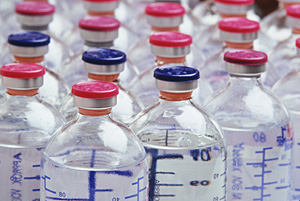 Under contract with the Contraception and Reproductive Health Branch, the Biological Testing Facility undertakes more than 150 screens, assays, safety tests, and analytical procedures for the evaluation of new drugs, formulations, and delivery systems. This Facility screens submissions of drugs for classical endocrine and anti-fertility activity and establishes potency ratios for those that exhibit significant effects. It has also developed methods for determining the duration of hormonal activity following oral, subcutaneous, or transdermal administration. The work done by the Biological Testing Facility allows researchers to assess the potential clinical utility of new compounds and formulations.
Under contract with the Contraception and Reproductive Health Branch, the Biological Testing Facility undertakes more than 150 screens, assays, safety tests, and analytical procedures for the evaluation of new drugs, formulations, and delivery systems. This Facility screens submissions of drugs for classical endocrine and anti-fertility activity and establishes potency ratios for those that exhibit significant effects. It has also developed methods for determining the duration of hormonal activity following oral, subcutaneous, or transdermal administration. The work done by the Biological Testing Facility allows researchers to assess the potential clinical utility of new compounds and formulations.
In recent years, this Facility has extended its capabilities to include development of radioimmunoassays (RIAs) for proteins and steroid hormones including generation, harvesting, and characterization of antibodies, iodination of tracers, and validation of the assay procedure. These processes permit researchers to determine alterations in endogenous hormone levels, as well as to conduct pharmacokinetic studies required by the FDA for new drug applications. The tests are also essential for determining the best clinical formulations for each route of administration.
The Biological Testing Facility has developed a procedure for evaluating of relative binding affinities for the receptors of: progesterone (rabbit uterus), estrogen (rat and rabbit uterus), glucocorticoid (rat thymus), and androgen (rat ventral prostate receptors). This development was undertaken because of the wide variation in relative binding affinities frequently reported from different laboratories. As a result, researchers are now able to test a broad spectrum of compounds within a standardized testing system.